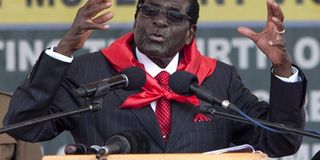Robert Mugabe’s government licences private radio stations

Zimbabwean President Robert Mugabe delivers a speech on February 28, 2015 during the celebration of his 91st birthday in Victoria Falls. AFP PHOTO | JEKESAI NJIKIZANA
What you need to know:
- The introduction of media reforms were one of the conditions of the power sharing agreement brokered by former South African President Thabo Mbeki.
- BAZ issued the first two private commercial radio licenses in 2011 to a State controlled media house and a company linked to a cabinet minister.
HARARE
Zimbabwe has licensed eight new commercial radio stations as it moves to dismantle a 35 year-old monopoly by the State broadcaster.
The Broadcasting Authority of Zimbabwe (BAZ) on Tuesday handed the licenses for metropolitan radio stations to companies linked to President Robert Mugabe’s ruling Zanu PF and the government.
BAZ issued the first two private commercial radio licenses in 2011 to a State controlled media house and a company linked to a cabinet minister.
The Media Institute of Southern Africa (Misa) Zimbabwe chapter said the latest development showed that the government was not genuine in its pledge to free the airwaves.
RULING PARTY
“No one should be shocked by the outcome of the licensing process. It was clear who were going to get it right from the moment the applications were submitted,” Misa Zimbabwe director Nhlanhla Ngwenya said.
“They are simply an expansion of the current status quo.
“We have seen the expansion of the state media empire through the Mass Media Trust subsidiary media houses as well as the entrenchment of (Cabinet minister) Supa Mandiwanzira's share in broadcasting,” he said.
Mr Ngwenya said the country’s broadcasting industry is still controlled by the ruling party despite claims by BAZ that it was opening up space for private players.
“In essence there has simply been an addition of platforms that are directly or indirectly linked to the ruling party, which compromises the diversity of views a liberalised broadcasting sector is meant to bring,” he added.
Zimbabwe started embarking on media reforms after President Mugabe formed a short-lived inclusive government with his rivals in 2009.
The introduction of media reforms were one of the conditions of the power sharing agreement brokered by former South African President Thabo Mbeki.
However, critics say the reforms have not been far reaching enough as the ruling Zanu PF attempts to cling on to key media institutions in the country.




